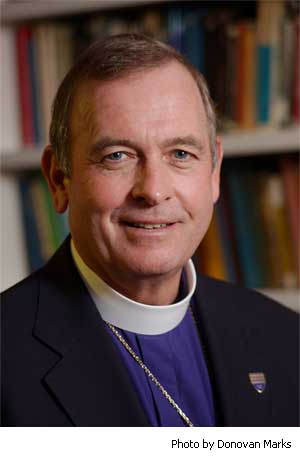 United States Mission to the OSCE
United States Mission to the OSCE
Session 5: The role of education to promote mutual understanding and respect for diversity according to OSCE commitments As prepared for delivery by Bishop John Bryson Chane to the OSCE High-Level Conference on Tolerance and non-Discrimination June 30, 2010
Mr. Chairman,
As a public member of the United States delegation, I am honored to participate in this important session promoting mutual understanding and respect for diversity. The United States places great importance on respect for diversity and combating intolerance and discrimination around the world. It is the policy of the United States to protect the human rights and fundamental freedoms of all human beings, including the rights of the most vulnerable individuals in society.The United States condemns all human rights violations and private acts of violence committed against all individuals, including those committed on account of their gender, race, or sexual orientation.
The United States applauds the work of the OSCE’s Tolerance Unit to combat anti-Semitism and other forms of intolerance. Since its establishment in 2004 within the OSCE’s Office of Democratic Institutions and Human Rights (ODIHR), the Tolerance Unit has made great strides in combating intolerance including numerous initiatives in educational, legislative assistance, and law enforcement and civil society capacity-building programs in the OSCE region.
The United States government does not accept cultural relativism in the application of human rights standards. Human rights do not depend on-and are not subject to-different interpretations of morality. In any event, immorality can be a changing concept. Slavery was once considered morally acceptable and lawful in most countries, including my own. Today, slavery in all its forms is a crime against humanity. In 1948 when the Universal Declaration of Human Rights was adopted, its protections against discrimination on the basis of race, color, sex, religion, political or other opinion, national origin or other status did not reflect custom or practice in most parts of the world-including the west. Culture, tradition and religious intolerance cannot justify denying people respect for their human rights.
This applies equally to persons who are victims of private acts of violence and human rights violations committed against them because of their sexual orientation and gender identity. As Secretary of State Clinton said last week at the Department of State in Washington, “men and women are harassed, beaten, subjected to sexual violence, even killed because of who they are and whom they love. Some are driven from their homes or countries. And many who become refugees confront new threats in their countries of asylum. In some places, violence against the Lesbian/Gay/Bisexual/Transgender (LGBT) community is permitted by law and inflamed by public calls to violence; in others, it persists insidiously behind closed doors.”
Secretary Clinton continued, “These dangers are not “gay” issues. This is a human rights issue. Just as I was very proud to say the obvious more than 15 years ago in Beijing that human rights are women’s rights and women’s rights are human rights, well let me say today that human rights are gay rights and gay rights are human rights, once and for all.”
The position of the United States is that, just like all other human beings LGBT people are entitled to enjoy the full range of human rights. While all human rights apply to LGBT people, some are of particular importance. The right to life is violated when LGBT people are imprisoned, murdered with impunity either by or with the cooperation or silent assent of the police, or other security officials, as happens in a number of countries. LGBT people who are detained are sometimes subjected to torture, cruel, inhuman or degrading treatment. Freedom of expression, information and association and assembly are essential for LGBT people to be able to defend their rights and speak out against abuses. The right to privacy is necessary to enable LGBT individuals to live their life free from unlawful or arbitrary interference from the government.
Religious belief and theological interpretation are often used by some to justify discrimination, but freedom of religion must guarantee to individuals the right to manifest their beliefs only to the extent that this does not violate the rights of others. Nothing in international human rights can be relied upon to deny others the equal protection and enjoyment of their human rights.
President Obama has stated, “My Administration has partnered with the LGBT community to advance a wide range of initiatives. At the international level, I have joined efforts at the United Nations to decriminalize homosexuality around the world…..The criminalization of sexual orientation and gender identity is unconscionable…We urge all countries to stop using sexual orientation or gender identity as the basis for arrest, detention, or execution.…”
Mutual understanding and respect for diversity must be based on a comprehensive human rights agenda that includes the elimination of violence and human rights violations based on race, gender, sexual orientation and gender identity. We must all strive to create an environment in which everyone knows they are valued and feels free to make their contribution, where we recognize and celebrate the dignity, uniqueness and purpose of every individual. Sentiments expressed by political leadership must espouse universal human rights values rather than reinforce intolerant views. We must confront hatred and intolerance and protect and advance the rights of all human beings. As Secretary Clinton so eloquently stated; “We must commit ourselves to building a future in which every person-every single person-can live in dignity, free from violence, free to be themselves, free to live up to their God-given potential wherever they live and whoever they are.”
Thank you, Mr. Chairman.


